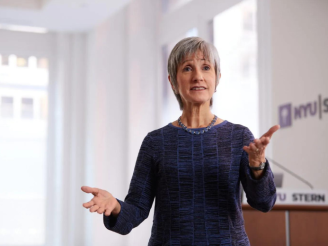Meet the Trailblazer: Kim Corfman is Out Front On New Learning Initiatives

Corfman has worn many hats since joining NYU Stern as an assistant professor in the Marketing Department in 1985, often leading nascent initiatives that tap her talent for creativity. Before leading the launch of the School’s groundbreaking, online Master of Science in Quantitative Management (MSQM) Program as Vice Dean for Online Learning, she served in such roles as Vice Dean for MBA Programs, academic director of the MBA in Fashion & Luxury, and deputy chair of the Marketing Department. Since last summer, her new role is Vice Dean for Learning Innovation, a unit that includes Experiential Learning, the Leadership Accelerator, the Learning Science Lab, and the Learning Innovation Lab. Corfman recently discussed the MSQM Program and other exciting teaching and learning initiatives underway at Stern.
You oversaw the first online degree program—the MSQM program—at Stern, which is now in its fifth year. What opportunities and challenges did an online program offer?
The opportunity was the ability to provide working professional students around the world with a high-quality, comprehensive foundation of business knowledge with an emphasis on becoming intelligent users of data. The biggest challenges were probably communicating what the program is and developing the content. Communication was a challenge because it is neither just a general management degree (despite including the MBA core) nor an analytics degree. Despite its immense practicality, no one had ever seen that combination before. Then there was the content development challenge. To make it accessible to students all over the world we had to use a mostly asynchronous format—asking students to watch three-hour videos of lectures was obviously not an option! The Learning Science Lab worked with each professor to match their learning objectives with the best tools—short videos with animations, auto-graded quizzes with immediate feedback, problem walkthroughs, simulations, slideshows, etc.
How do you think about learning innovations at Stern?
One of my favorite things about Stern is our enthusiasm for finding better ways, big and small, to do what we do. The Learning Innovation unit institutionalizes support for that and has an impact across programs and disciplines. Activities range from helping professors enhance the classroom learning experience, to working with programs to develop and introduce new kinds of courses, to introducing whole programs delivered in new ways. And we leverage what we learn. When the pandemic hit, the Learning Science Lab team used our online learning expertise to help faculty switch their teaching to Zoom and supplement with asynchronous content. The guides we developed are still in use today. The Learning Innovation Lab (LIL) doesn’t have permanent staff, but comes into being when there is an initiative requiring a focused support or launch team—it was inspired by the way we incubated the MSQM program. A recent LIL initiative includes the new undergraduate NYC Consulting Capstone course.
What challenges are you going to have to think about over the next few years? Does AI factor into the mix?
AI already presents tough challenges and fascinating opportunities. Initially, we mostly focused on how to deal with student use of generative AI tools when we didn’t want them to, but the conversation increasingly focuses on how faculty can incorporate it into assignments and leverage it for things like creating cases, exam questions, examples, and rubrics.
As you approached online learning at Stern, and being a pioneer in this space, what was it like to work without a blueprint and go into an uncharted area?
Fun and a little scary! We dipped our toes in the online learning waters with two non-degree certificates, Advanced Valuation and then Corporate Finance with Professor Aswath Damodaran. Aswath has a big following, so we knew we would have a big enough market for a good test of our ability to do this. NYU was very generous with production help at this stage, and we learned a lot from them. This gave us the confidence to develop additional certificates ourselves and proceed with a degree program.
Creativity seems to be a common thread among your various vice dean roles at Stern. Can you talk about creativity as a through line?
I have never done academic research on creativity, but I have studied the scholarship and developed a course on creativity, which I taught for several years. My favorite thing is to define a problem and come up with ways to solve it in the service of something I believe in—and I certainly believe in Stern!
